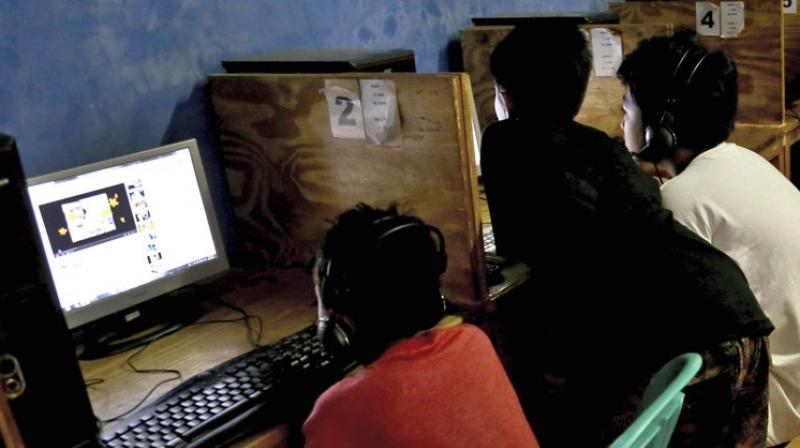Advocates condemn psych techniques used to keep kids online

Children’s advocates want the American Psychological Association to condemn the tech industry’s practice of using persuasive psychological techniques to keep kids glued to their screens.
The advocates, citing research that links the excessive use of social media and video games with depression and academic troubles, say it’s unethical for psychologists to be involved in tactics that risk harming kids’ well-being. Sceptics say the research is inconclusive, and they note that psychologists have been involved in other industries’ marketing and advertising for decades.
The group seeking intervention includes 60 US psychologists, researchers, children’s advocates and the Children’s Screen Time Action Network, a project of the Boston-based Campaign for a Commercial-Free Childhood. The network was publishing a letter Wednesday to the American Psychological Association, coinciding with the association’s annual meeting in San Francisco.
“There are powerful psychology principles and technology that are being used against kids in ways that are not in their best interests,” said Josh Golin, executive director of the Campaign for a Commercial-Free Childhood.
That technology uses computers to help figure out what motivates people and influence their online behaviour. It’s built on age-old tenets of behavioural psychology that marketers and advertisers have long used to get people to buy their products. The difference is smartphones are ubiquitous and unlike human marketers, they don’t get tired, said B.J. Fogg, a behavioural scientist at Stanford University who has been called the technology’s pioneer.
Fogg said he has aimed to use persuasive tech to enhance people’s lives. But he also said he has long warned that it has a “dark side,” including a potential loss of privacy and the potential for encouraging behaviour that isn’t in users’ best interests.
The letter to the psychology association cites a recent study that found that teen girls who spend a lot of time on digital devices, including on social media, are at risk for depression and suicidal behaviours. That study couldn’t show whether depressed girls might be more prone to using social media than other teens.
The letter also notes evidence that some teen boys overuse video games “at the expense of obtaining real-world competencies,” including college educations and jobs.
“Families don’t understand why their kids are so strongly attracted and pulled to these devices,” said Richard Freed, a Walnut Creek, California, psychologist who signed the letter. He said the World Health Organisation’s decision in June to declare excessive video gaming an addiction shows that the problem is real.
Under Fogg’s model, technology can change a person’s behaviour by tapping into hard-wired motivations, simplifying the activity and getting people to perform it with a “well-timed” trigger. That could mean an app prompting a person to go running or it could be an alert persuading someone to spend more time on social media based on their innate desire to win acceptance and avoid social rejection.
It’s not just the big tech firms. BuzzFeed reported Tuesday, based on a confidential company memo, that founder of a startup recently acquired by Facebook boasted of using a “psychological trick” — custom social media profiles and mysterious calls to action — to get high schoolers to download a polling app. Facebook later shut down the app.
In job postings, big tech companies have sought psychologists and people with psychology training for research into user experiences. Microsoft’s Xbox user research division is led by psychologists. Amazon looks for hires who “geek out over user research, psychology, ethnography.” Google’s preferred qualification for some positions includes a doctorate in experimental psychology.
“We strive to learn and understand our users’ needs, behaviours, and emotions to yield insights that inform product strategy and guide the design of the experiences we create,” says one Google job posting online this week.
Facebook and Google didn’t return requests for comment Tuesday on whether they use psychological persuasion techniques to build digital products for children. Apple said Wednesday that it doesn’t. Microsoft and Amazon declined to comment.
This year, those companies have promoted better digital well-being amid rising concerns about kids’ digital distractions.
The Internet Association, an industry trade group, said its member companies endeavour to create safe and positive online experiences.
“This is an important conversation, and the internet industry remains committed to developing and sharing best practices, partnering and collaborating with experts, and developing resources and programs that will ensure positive online experiences,” the association’s Noah Theran said in the statement.
Apple is introducing new tools meant to make its iPhone less addictive after two major shareholders earlier this year called on the company to curb smartphone addiction among children. Facebook, YouTube and Microsoft have introduced similar tools.
The American Psychological Association has no policy on using psychological research to develop a persuasive digital technology.
But in a statement responding to the advocates’ letter, association CEO Arthur Evans Jr. said the group “is concerned about the increasing amount of time children are spending on digital devices.”
He said the association is examining psychology’s role in technology development, and that an association committee will discuss the letter and whether to recommend any action.
Click on Deccan Chronicle Technology and Science for the latest news and reviews. Follow us on Facebook, Twitter.

